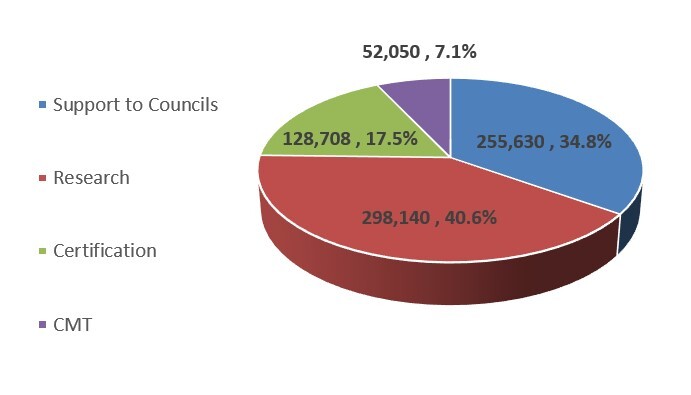Learning
Deliveries and Certifications
Throughout 2020/21, ICCS facilitated over 15 training sessions for organizations from across the Canadian Public Sector as follows:
- 7 Certified Service Professional (CSP) workshops
- 10 Certified Service Manager (CSM) workshops
- 2 ICCS Customized Workshops
Licensed jurisdictions continue to facilitate ICCS training on our behalf within their respective organizations, with over 400 public sector employees participating in over 20 deliveries across Canada this year.
The number of certified professionals continues to increase nationwide, with over 950 CSPs and CSMs to date.
Developments
Throughout 2020-2021, work on the Learning Programs refresh has progressed steadily. We are pleased to share that four new learning modules have been released this past year:
- Becoming Citizen-Centric
- Public Service Delivery Fundamentals
- Listening to and Understanding Citizens
- Citizen-Centred Service Design
2021 will see the release of five additional modules:
- Guide to Effective Service Delivery Management
- Building Service Culture Through Leadership
- Guide to Continuous Service Improvement
- Building Inclusive Leadership Culture
- Behavioural Insights and Service Delivery
These eLearning modules have supported the ICCS’ mandate of providing training that supports a citizen-centred approach to service delivery that meets the learning needs of today’s public servant. It has also enabled the ICCS to expand its services to creating customized learning materials for government organizations in Canada, which has led to partnerships with organizations such as the Joint Councils and the internationally recognized Apolitical.
Partnerships
ICCS is pleased to have worked with the following organizations:
- Provincial Government of British Columbia
- Provincial Government of Newfoundland & Labrador
- Provincial Government of Saskatchewan
- Government of Northwest Territories
- Canada Revenue Agency
- Immigration, Refugees, and Citizenship Canada
- Joint Councils
- Apolitical
Research
Citizens First 2020
The Citizens First 2020 study was carried out in four waves between June 2020 and January 2021. The survey continued to track public sector performance across various service dimensions and asked respondents about the key service-related areas that had been examined in previous iterations, including service reputation, client experience and expectations, as well as channel usage. The decision to move away from a single wave of data collection has proven timely as the new approach allowed the ICCS to track how public sector clients’ perspectives have evolved during the COVID-19 crisis. In addition, the study also contained several question items specific to governments’ responses to the pandemic.
Some of the additional new features of the study included:
- Online portal for subscribing jurisdictions;
- Summary reports for subscribers after each of the initial three waves;
- Bigger sample sizes for participating jurisdictions;
- Additional options for subscribers, including the ability to add their own question items; and
- More cost-effective subscription options.
Aside from focusing on the service issues connected to the COVID-19 pandemic, the study continued to look at other topics of special interest to public sector service providers. Two such areas explored in the study were digital identity and artificial intelligence, which have been identified as being of particular importance for the future of service delivery.
The results of the study are scheduled to become available in the first quarter of 2020-2021.
Emotional Engagement Research
In parallel with its core research studies, the ICCS has begun a collaboration with PathosAI with the aim of taking advantage of the latest in AI analytics and going beyond the current scope of analysis to provide the next level of insight to its clients. The pilot project was designed to test PathosAI’s unique artificial intelligence models and tools to measure emotions of Canadians in connection with accessing government services, identify the drivers of those emotions, and calculate the emotional engagement with government. The initial focus has been on analyzing open-ended responses from recent Citizens First studies to demonstrate the value of the approach to ICCS’ clients. Following the successful completion of the initial stages of the project, including a webinar on the results, delivered in February 2021, the ICCS and PathosAI have been in discussions about the next steps that would involve further enhancements as well as engagement with potential users.
Councils
In 2020-2021, the ICCS Secretariat continued to provide support services to the Public Sector Service Delivery Council (PSSDC) and the Public Sector Chief Information Officer Council (PSCIOC). The Secretariat organized monthly virtual meetings of the Joint Councils, PSSDC, PSCIOC, and additional learning event sessions on topics of common interest and sharing of best practices from across the country.
The Joint Councils, PSSDC and PSCIOC oversee many inter-jurisdictional working groups and communities of practice that focus on the Councils’ identified priority areas: Digital Identity, Client Centric Services, Research and Strategic Intelligence, Privacy, Cybersecurity, IT Procurement, Cloud Services, Service to Business, Open Source, Open Government, among others. A key mandate of the Councils is inter-jurisdictional collaboration to enhance the efficacy of public sector service delivery.
Digital Identity remains a key priority of the Joint Councils. To accelerate the work on this priority, the Joint Councils appointed a Pan-Canadian Digital Identity Program Executive in early 2020. This executive fosters relationships on behalf of the public sector to advance the digital identity program both within the Joint Councils digital identity bodies, including engagement of the newly established Jurisdictional Experts on Digital Identity, and external stakeholders.
Citizens want quick, convenient access to online programs and services from both public and private sectors and to be assured that their personal information will be collected, used and disclosed in accordance not only with the principles of privacy by design, but also in accordance with applicable laws and regulations. Digital identity is crucial to transforming government services and Canada’s societal and economic future depends on it.
Digital Government requires more than incremental changes to address current and forthcoming challenges, implies reconfiguring the responsibilities of different levels of government and how they intersect and coordinate - essentially rethinking the architecture of government, especially governance and leadership. As a result of the pandemic, the Joint Councils remain conscious of the fluid external environment in which it operates and that it needs to be attentive and responsive to change. The Councils frequently re-visit priorities whilst consulting with members to ensure that its best positioned for collective impact.
Common Measurements Tool (CMT)
CMT and Citizen First Analytics
The Common Measurements Tool (CMT) continues to be employed by organizations across various jurisdictions and levels of government who use it to gain actionable insights regarding the quality of their services.
In 2020-2021, Citizen First Analytics, the platform developed in partnership with PigeonLine to allow CMT users to access ICCS’ benchmarking database in a time- and cost-effective way with an increased number of analytical features and a self-serve option, has been made available to new and existing clients. Several organizations have accessed the service to obtain benchmarking insights and have provided feedback on their experience. Enhancements continue to be implemented and additional features are planned.
In addition to licensing the CMT, the ICCS has also been offering more active support to users of the instrument. This includes the collaboration with BizPaL, which involves the ICCS helping with developing a new survey instrument for the organization, its implementation, as well as analysis and reporting of the results.
In 2020-2021, the following jurisdictions were licensed to use the CMT:
Canada:
- Access PEI
- Alberta Workers’ Compensation Board
- BC Stats
- BizPaL
- Service Canada
International:




